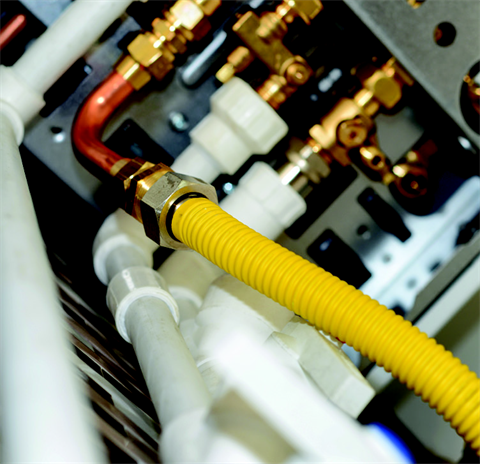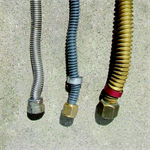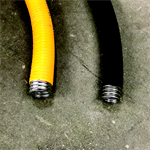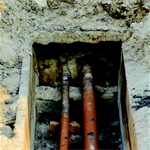Customer-Owned Gas Piping: Things To Know

Clearwater Gas System’s first priority is the safety of its customers, the general public and its team members. When used properly, gas energy is one of the safest and most reliable forms of energy available. However, as with all forms of energy, improper or careless use of gas energy may cause property damage or personal injury. Please review the related gas safety information inside regarding customer-owned gas piping to learn more about your responsibilities for required maintenance and upkeep as a homeowner and/or business owner.
When used properly, gas energy is one of the safest and most reliable forms of energy available.
The Basics
Clearwater Gas System (CGS) maintains the gas piping from the street to the natural gas meter outlet or from the propane (LP) tank to the outlet of the LP second-stage regulator. All-natural gas lines from the meter outlet or LP gas lines from the outlet of the second stage regulator are owned by you, the customer, and their upkeep is your responsibility. Maintenance issues may arise depending on several things: whether the pipe is buried, if corrugated stainless steel tubing is installed, or the age of the appliance connector that is used.
Installation, Maintenance and Repair
To ensure a safe and properly functioning appliance and gas piping delivery system, be sure to hire only licensed gas contractors or plumbers to install, repair and maintain your gas appliances, piping and equipment.
1. Interior Piping and Appliance Connector Safety
 Gas connectors need to be inspected regularly and replaced as needed. Certain types of flexible connectors manufactured between 1970 and 1980 may fail over time and need to be replaced.
Gas connectors need to be inspected regularly and replaced as needed. Certain types of flexible connectors manufactured between 1970 and 1980 may fail over time and need to be replaced.
Only qualified professionals should check and/or replace appliance connectors. Don't attempt to do this yourself.
- After disconnecting gas appliances, gas connectors and appliance shut-off valves should always be removed, and the gas line should be plugged and capped.
- Gas pipes should be properly maintained and should never be used improperly - such as to hang clothes.
- New uncoated stainless steel
- New coated stainless steel
- Old uncoated brass
2. Corrugated Stainless-Steel Tubing (CSST)
 Corrugated stainless steel tubing, or CSST, is a flexible, stainless steel tubing used to supply both natural and LP gas in residential, commercial and industrial structures. CSST is coated with a yellow or black exterior plastic jacket coating. CSST should not be confused with flexible gas appliance connectors, which join an appliance to your home or building’s gas supply line. The difference is that flexible connectors attach directly to the appliance from the wall or floor, while the CSST is usually routed beneath, through and alongside joists in basements where applicable, crawl spaces, inside interior wall cavities and/or on top of ceiling joists and in attic spaces. If lightning strikes the surrounding outside area of your structure that contains CSST, there is a risk the lightning can travel through the structure’s gas piping system and cause a leak or, in some instances, a fire. If you find CSST in your home or business, customers should have a licensed electrician install a bonding jumper from the CSST to the building’s grounding electrode to reduce the chances of a gas leak or fire. During routine residential gas system inspections conducted prior to the initiation of gas service, our technicians have encountered CSST piping installations that are not properly bonded. This deficiency requires Clearwater Gas System to issue a red tag and leave the gas service off until bonding and any additional repairs are completed, inspected and approved.
Corrugated stainless steel tubing, or CSST, is a flexible, stainless steel tubing used to supply both natural and LP gas in residential, commercial and industrial structures. CSST is coated with a yellow or black exterior plastic jacket coating. CSST should not be confused with flexible gas appliance connectors, which join an appliance to your home or building’s gas supply line. The difference is that flexible connectors attach directly to the appliance from the wall or floor, while the CSST is usually routed beneath, through and alongside joists in basements where applicable, crawl spaces, inside interior wall cavities and/or on top of ceiling joists and in attic spaces. If lightning strikes the surrounding outside area of your structure that contains CSST, there is a risk the lightning can travel through the structure’s gas piping system and cause a leak or, in some instances, a fire. If you find CSST in your home or business, customers should have a licensed electrician install a bonding jumper from the CSST to the building’s grounding electrode to reduce the chances of a gas leak or fire. During routine residential gas system inspections conducted prior to the initiation of gas service, our technicians have encountered CSST piping installations that are not properly bonded. This deficiency requires Clearwater Gas System to issue a red tag and leave the gas service off until bonding and any additional repairs are completed, inspected and approved.
3. Buried Piping
 Customers who own buried piping must be made aware of the following:
Customers who own buried piping must be made aware of the following:
- Clearwater Gas System does not own, line locate or maintain customers' buried piping.
- Buried metallic piping that is not maintained may corrode or leak.
Most customer-owned piping systems are designed, permitted, installed and inspected in accordance with Florida adopted building codes. Florida’s soil and environmental conditions can encourage corrosion of buried metallic piping. Over time, this could result in leakage. The best way to avoid this potential hazard is to periodically inspect underground gas piping and repair any unsafe conditions. Licensed gas plumbers, natural gas and propane contractors can conduct periodic inspections and any required maintenance.
24-HOUR EMERGENCY SERVICE IS AVAILABLE WITH A PHONE CALL TO CLEARWATER GAS SYSTEM’S EMERGENCY LINE AT (727) 462-6633.